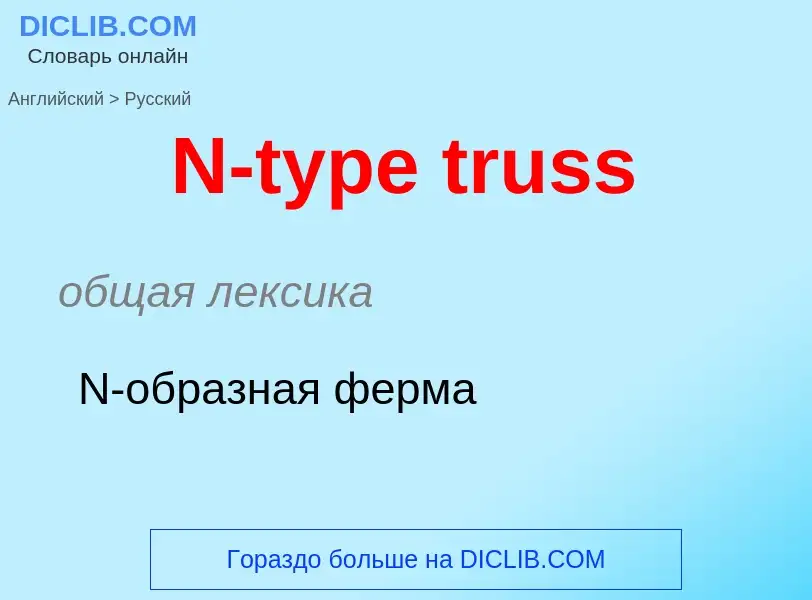Tradução e análise de palavras por inteligência artificial ChatGPT
Nesta página você pode obter uma análise detalhada de uma palavra ou frase, produzida usando a melhor tecnologia de inteligência artificial até o momento:
- como a palavra é usada
- frequência de uso
- é usado com mais frequência na fala oral ou escrita
- opções de tradução de palavras
- exemplos de uso (várias frases com tradução)
- etimologia
N-type truss - tradução para Inglês
общая лексика
N-образная ферма
строительное дело
ферма Паркера
ферма с полигональным верхним поясом
общая лексика
ферма с полураскосной решеткой
Definição
Wikipédia
An extrinsic semiconductor is one that has been doped; during manufacture of the semiconductor crystal a trace element or chemical called a doping agent has been incorporated chemically into the crystal, for the purpose of giving it different electrical properties than the pure semiconductor crystal, which is called an intrinsic semiconductor. In an extrinsic semiconductor it is these foreign dopant atoms in the crystal lattice that mainly provide the charge carriers which carry electric current through the crystal. The doping agents used are of two types, resulting in two types of extrinsic semiconductor. An electron donor dopant is an atom which, when incorporated in the crystal, releases a mobile conduction electron into the crystal lattice. An extrinsic semiconductor which has been doped with electron donor atoms is called an n-type semiconductor, because the majority of charge carriers in the crystal are negative electrons. An electron acceptor dopant is an atom which accepts an electron from the lattice, creating a vacancy where an electron should be called a hole which can move through the crystal like a positively charged particle. An extrinsic semiconductor which has been doped with electron acceptor atoms is called a p-type semiconductor, because the majority of charge carriers in the crystal are positive holes.
Doping is the key to the extraordinarily wide range of electrical behavior that semiconductors can exhibit, and extrinsic semiconductors are used to make semiconductor electronic devices such as diodes, transistors, integrated circuits, semiconductor lasers, LEDs, and photovoltaic cells. Sophisticated semiconductor fabrication processes like photolithography can implant different dopant elements in different regions of the same semiconductor crystal wafer, creating semiconductor devices on the wafer's surface. For example a common type of transistor, the n-p-n bipolar transistor, consists of an extrinsic semiconductor crystal with two regions of n-type semiconductor, separated by a region of p-type semiconductor, with metal contacts attached to each part.


![[[Forth Bridge]] across the [[Firth of Forth]] in the east of Scotland [[Forth Bridge]] across the [[Firth of Forth]] in the east of Scotland](https://commons.wikimedia.org/wiki/Special:FilePath/Bb-forthrailbridge.jpg?width=200)
![The [[Fair Oaks Bridge]] is an example of Pennsylvania Petit truss bridge. The [[Fair Oaks Bridge]] is an example of Pennsylvania Petit truss bridge.](https://commons.wikimedia.org/wiki/Special:FilePath/Fair Oaks Bridge.jpg?width=200)
 from east in 2010.jpg?width=200)
![HAER]] diagram of a Long truss HAER]] diagram of a Long truss](https://commons.wikimedia.org/wiki/Special:FilePath/Long Truss Bushing CB (Versailles SP) 00003r.jpg?width=200)
![Macleay River Railway Bridge]] - a Pratt truss design - at Kempsey, NSW, Australia Macleay River Railway Bridge]] - a Pratt truss design - at Kempsey, NSW, Australia](https://commons.wikimedia.org/wiki/Special:FilePath/Macleay River Railway Bridge Kempsey NSW.jpg?width=200)


![[[Homestead Grays Bridge]] over the [[Monongahela River]] in [[Pittsburgh, Pennsylvania]] [[Homestead Grays Bridge]] over the [[Monongahela River]] in [[Pittsburgh, Pennsylvania]]](https://commons.wikimedia.org/wiki/Special:FilePath/Pittsburgh IMG 20150308 184143 (16653784330).jpg?width=200)
![The lattice truss [[Runcorn Railway Bridge]]. The lattice truss [[Runcorn Railway Bridge]].](https://commons.wikimedia.org/wiki/Special:FilePath/Runcorn Railway Bridge.jpg?width=200)


![Pratt '''through truss''' of the former [[Seaboard Air Line Railway]], located near the village of Willow, [[Florida]]; abandoned since the mid-1980s Pratt '''through truss''' of the former [[Seaboard Air Line Railway]], located near the village of Willow, [[Florida]]; abandoned since the mid-1980s](https://commons.wikimedia.org/wiki/Special:FilePath/LittleManateeRiver.jpg?width=200)
![Lockport, New York]] Lockport, New York]]](https://commons.wikimedia.org/wiki/Special:FilePath/ErieCanalRRBridge04 1A.jpg?width=200)
![General Hertzog Bridge]] over the [[Orange River]] at [[Aliwal North]] carries vehicular traffic General Hertzog Bridge]] over the [[Orange River]] at [[Aliwal North]] carries vehicular traffic](https://commons.wikimedia.org/wiki/Special:FilePath/General Hertzog Bridge over Orange River at Aliwal North.jpg?width=200)
![collapsed]] after an overhead support was hit by a passing truck collapsed]] after an overhead support was hit by a passing truck](https://commons.wikimedia.org/wiki/Special:FilePath/05-23-13 Skagit Bridge Collapse.jpg?width=200)
![San Jacinto River]] truss bridge – [[Humble, Texas]] San Jacinto River]] truss bridge – [[Humble, Texas]]](https://commons.wikimedia.org/wiki/Special:FilePath/Old San Jacinto River Truss Bridge -- Humble, Texas.jpg?width=200)

![Sky Gate Bridge R at [[Kansai International Airport]], [[Osaka]], Japan, is the longest double-decked truss bridge in the world. It carries three lanes of automobile traffic on top and two of rail below over nine truss spans. Sky Gate Bridge R at [[Kansai International Airport]], [[Osaka]], Japan, is the longest double-decked truss bridge in the world. It carries three lanes of automobile traffic on top and two of rail below over nine truss spans.](https://commons.wikimedia.org/wiki/Special:FilePath/Sky gate bridge01s3200.jpg?width=200)
![Railroad Truss bridge over Trinity River near [[Goodrich, Texas]] Railroad Truss bridge over Trinity River near [[Goodrich, Texas]]](https://commons.wikimedia.org/wiki/Special:FilePath/Railroad Truss bridge over trinity river near Goodrich, Texas.jpg?width=200)

![rail track]] in [[Leflore County, Mississippi]] rail track]] in [[Leflore County, Mississippi]]](https://commons.wikimedia.org/wiki/Special:FilePath/Columbus and Greenville Railway bridge over Yazoo River.jpg?width=200)

![Mura River]] in [[Mursko Središće]], [[Croatia]] Mura River]] in [[Mursko Središće]], [[Croatia]]](https://commons.wikimedia.org/wiki/Special:FilePath/Željeznički most, Mursko Središće.3.jpg?width=200)

![A multi-span '''simple truss''' bridge, [[Vivekananda Setu]] over the [[Hooghly River]] in [[Kolkata]], [[India]]. A multi-span '''simple truss''' bridge, [[Vivekananda Setu]] over the [[Hooghly River]] in [[Kolkata]], [[India]].](https://commons.wikimedia.org/wiki/Special:FilePath/Bally Bridge.jpg?width=200)
![A '''cantilever truss''' bridge, [[Quebec Bridge]] over the [[Saint Lawrence River]] in [[Quebec]], [[Canada]]. A '''cantilever truss''' bridge, [[Quebec Bridge]] over the [[Saint Lawrence River]] in [[Quebec]], [[Canada]].](https://commons.wikimedia.org/wiki/Special:FilePath/Le pont de Québec, de l'embouchure de la rivière Chaudière.jpg?width=200)

![[[Jay Bridge]] showing the truss design. [[Jay Bridge]] showing the truss design.](https://commons.wikimedia.org/wiki/Special:FilePath/Jay Bridge interior.jpg?width=200)
![[[Westham Island Bridge]] showing its wooden truss design. [[Westham Island Bridge]] showing its wooden truss design.](https://commons.wikimedia.org/wiki/Special:FilePath/Westham island bridge.jpg?width=200)
